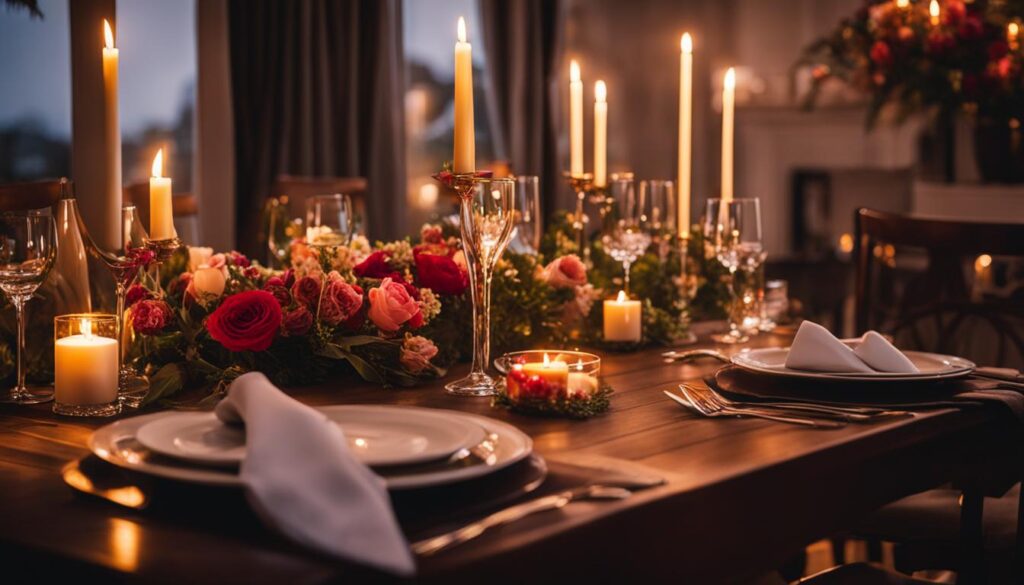We may earn money or products from the companies mentioned in this post.
Selecting the right venue is a crucial aspect of event planning. The venue sets the tone for your event and can impact the overall experience of your attendees. However, the venue selection process can be overwhelming, especially if you’re unsure about what to look for. That’s why we’ve put together this comprehensive guide to help you navigate the venue selection process and ensure you find the best venue for your event. In this section, we’ll provide you with tips and tricks on how to select the best venue for events and guide you through the venue selection process.
Key Takeaways
- Choosing the right venue is a crucial aspect of event planning.
- The venue sets the tone and can impact the overall experience of your attendees.
- The venue selection process can be overwhelming, but this guide is here to help.
- We’ll provide you with tips and tricks on how to select the best venue for events.
- We’ll guide you through the venue selection process step-by-step.
Understanding Your Event Requirements
When planning any event, selecting the perfect venue is one of the most important decisions you will make. It can be overwhelming to choose from the vast array of options available, but understanding your event requirements is the first step in selecting the right one. Whether you’re searching for top venues for corporate events or the ideal space to celebrate your special day, here are some things to consider before making your decision.
Identify the Type of Event You Want to Host
The first step in understanding your event requirements is to identify the type of event you want to host. Is it a formal corporate event, a wedding, or a casual social gathering? The answer to this question will impact the type of venue you choose. For example, a corporate event will require a different atmosphere and amenities than a social gathering.
Consider the Size of Your Guest List
Another important factor to consider when understanding your event requirements is the number of guests attending. Knowing the approximate number of attendees will help you narrow down your venue options. If you’re hosting a large event, such as a wedding reception, you’ll need a venue with ample space to accommodate all your guests comfortably.
Establish a Budget
Establishing a budget is also crucial when understanding your event requirements. The cost of venue rental can vary widely, so it’s essential to have a clear idea of how much you can afford to spend. This will help you avoid wasting time visiting venues that are well beyond your budget.
Think About the Event Date and Time
The date and time of your event can also impact your venue selection. Certain venues may not be available during your preferred date or time, or they may charge more for popular event dates, such as weekends or holidays. Therefore, it’s crucial to choose a venue that can accommodate your event timing requirements without breaking the bank.
Type of Venue
Once you’ve considered your event requirements, the next step is to select the type of venue that best fits your needs. Whether it’s a hotel, banquet hall, or outdoor space, consider the style and ambiance you’re looking for and ensure that the venue aligns with your vision.
By understanding your event requirements, you’ll be better equipped to choose the right venue for your event. Whether you’re looking for top venues for corporate events or simply searching for the perfect place to celebrate your special occasion, taking the time to consider your needs will help you make an informed decision.
Researching Potential Venues
Once you have a clear understanding of your event requirements, it’s time to start researching potential venues. Finding the perfect event venue requires research, and this section provides valuable venue selection tips to make your search easier and effective.
- Start online: The internet is a great resource to find potential event venues. You can search for venues on various websites, social media platforms, and online directories. These sources provide details about the venue location, capacity, amenities, and pricing.
- Get recommendations: Word of mouth is a powerful tool when searching for the perfect event venue. Ask friends, family, and colleagues for recommendations based on their past experiences. You can also consult event planners, caterers, and other vendors who have worked at different venues.
- Visit the venue: After shortlisting potential venues, schedule a site visit for each of them. This will give you a chance to see the venue firsthand, evaluate the space, and ask any questions you might have. During your visit, pay attention to the venue’s location, accessibility, ambiance, and overall condition.
- Read reviews: Reading reviews from past clients can provide valuable insights into the venue’s quality of service and customer experience. You can find reviews online or request the venue to provide references from past clients.
“Conducting thorough research is key to finding the perfect event venue. By utilizing online resources, seeking recommendations, visiting the venue, and reading reviews, you can make an informed decision and find a venue that meets all your needs.”
Considering Logistics and Amenities
Logistics and amenities are essential factors when selecting a venue. You want to ensure that the venue can accommodate all your needs and provide a comfortable experience for your guests. To help you with the selection process, we’ve created a comprehensive venue selection checklist.
Venue Selection Checklist
| Logistics | Amenities |
|---|---|
| Convenient location with ample parking | Restrooms with adequate facilities and hygiene |
| Wheelchair accessibility for guests with disabilities | Audio-visual equipment and stage setup options |
| Security and emergency services availability | Catering options with dietary restriction flexibility |
| Lighting arrangements and options | Decoration and floral arrangements |
| Accommodation options for out-of-town guests | Childcare or entertainment services |
As you can see, logistics and amenities can make or break an event. It’s essential to have a clear idea of what you need before starting the venue search to find the perfect venue options for weddings or any other events.
Evaluating the Venue’s Capacity and Layout
The capacity and layout of your chosen venue are essential for your event to run smoothly. It is crucial to evaluate whether the venue’s size and structure can accommodate your guests and your event’s requirements.
Capacity
Before selecting a venue, decide on the number of guests you expect to attend. It’s essential to choose a venue that can accommodate the number of guests and ensure everyone is comfortable.
| Venue | Capacity |
|---|---|
| Banquet Hall | Up to 250 guests |
| Outdoor Venue | Up to 500 guests |
| Ballroom | Up to 1000 guests |
Remember to consider other factors, such as tables, chairs, buffet stations, and dance floors, when assessing capacity.
Layout
The layout of the venue impacts the flow and atmosphere of your event. Consider the following factors when assessing the layout:
- Is the seating arrangement suitable for your event?
- Are there different spaces for various activities, such as dining, dancing, and networking?
- Is there enough space for equipment, such as AV systems, staging, or decorations?
- Are restrooms and other facilities conveniently located?
A venue with flexible space options can help you customize the layout to fit your event’s requirements.
Keep in mind that the venue’s capacity and layout are essential but not the only factors to consider during the venue selection process. Ensure you have a complete understanding of all the factors before making the final decision.
Understanding Costs and Budget
When it comes to selecting a venue for your event, it’s essential to have a budget in mind. The venue cost can vary depending on several factors, such as location, size, and amenities. Therefore, the venue selection process should involve analyzing the overall expenditure of your event.
The first step in setting a budget is determining how much you can afford to spend on the venue. Once you have a rough estimate in mind, you can start researching venue options that align with your budget. Remember to keep in mind any additional expenses, such as catering, decorations, and entertainment, that will factor into your total event cost.
It’s also essential to understand the different pricing models for venues. Some venues charge a flat fee, while others have a per-person charge. Make sure you understand the pricing structure before committing to a venue to avoid any surprise costs.
When choosing a venue, don’t forget to consider the value for money. It’s not always about finding the cheapest venue but selecting one that offers the best value for your budget. A budget-friendly venue with excellent amenities and service may be a better option than a more expensive venue with limited amenities.
Overall, understanding the costs and budget involved in the venue selection process is crucial to organizing a successful event. By setting a budget, researching pricing models, and finding a venue that offers the best value for money, you can choose the right venue for your event while staying within your budget.
Negotiating Contracts and Agreements
Finally, the venue selection process is almost over. You have found the perfect event venue that fits your requirements, meets your budget, and has all the amenities and logistics you need. Now it’s time to discuss the terms, sign the contract, and ensure that your interests are protected.
In this section, we will provide you with some valuable venue selection tips to help you negotiate contracts and agreements successfully. Here are some essential factors to consider:
- Price and payment terms: Negotiate the price and discuss payment terms with the venue management. Be sure to understand the payment schedule, deposit amounts, and the total cost of the venue.
- Cancellation policy: Discuss the cancellation policy and make sure it aligns with your needs. Some venues charge a fee for cancellations, while others may have a more flexible policy.
- Insurance: Ensure the venue has appropriate insurance coverage. If not, consider purchasing event insurance to protect yourself from any unforeseen circumstances.
- Security and liability: Discuss security measures and ensure the venue has adequate liability coverage.
- Additional services and rentals: Discuss any additional services or rentals you may need, such as catering, lighting, or audiovisual equipment. Be sure to clarify pricing and payment terms for these services.
By discussing these factors with the venue management, you can ensure a smooth and successful event. Don’t be afraid to ask questions and clarify any doubts or concerns you may have.
“Remember, the venue wants your business, and is often willing to work with you to ensure a positive outcome for both parties.”
Finally, review the contract thoroughly before signing and ensure that all the agreed-upon terms are included. If there are any discrepancies, discuss them with the venue management and get them resolved before signing the contract.
With these venue selection tips, you can negotiate contracts and agreements successfully, ensuring a perfect event venue for your upcoming occasion.
Conclusion
Choosing the perfect venue for your event can seem overwhelming, but with the right tips and tricks, the process can be simplified and stress-free. This comprehensive guide has provided you with all the necessary information to help you navigate through the venue selection process with ease.
Remember Your Event Requirements
Before you start your venue search, it’s essential to keep your event requirements in mind. Whether you’re planning a corporate event or a wedding, selecting the right venue that meets your specific needs is crucial.
Researching Potential Venues
Researching potential venues is essential to find the perfect event venue. From online research to recommendations and site visits, this guide has provided you with practical tips to help you find the right venue.
Consider Logistics and Amenities
Logistics and amenities are essential factors to consider when selecting a venue. From parking facilities to catering options, it’s crucial to create a venue selection checklist to ensure you find a venue that meets all your requirements.
Evaluate the Venue’s Capacity and Layout
Capacity and layout are significant factors that play a crucial role in the success of your event. This guide has discussed how to evaluate a venue’s capacity and how the layout can enhance the overall experience.
Understanding Costs and Budget
Choosing a venue that aligns with your budget is a crucial aspect of finding the perfect venue. This guide has provided you with information on the different cost factors associated with venue selection, ensuring you choose the right venue.
Negotiating Contracts and Agreements
Once you’ve found the perfect venue, it’s time to negotiate the contract and agreements. This guide has provided valuable tips on negotiating terms, discussing cancellation policies, and ensuring your interests are protected.
By following the tips and tricks outlined in this venue selection guide, you can simplify the process and ensure a successful event. Happy venue hunting!
FAQ
What are some tips for selecting the best venue for events?
When selecting a venue for events, it’s important to consider factors such as the location, size, amenities, and cost. Researching potential venues, visiting them in person, and evaluating their capacity and layout can help you make an informed decision.
How can I choose the right venue for my specific event?
Understanding the requirements of your event is crucial in choosing the right venue. Whether you’re planning a corporate event or a wedding, consider factors such as the purpose of the event, the number of attendees, and any specific needs or preferences you may have.
What are some tips for finding the perfect event venue?
To find the perfect event venue, you can start by conducting online research, seeking recommendations from trusted sources, and visiting potential venues to get a firsthand experience. It’s also important to consider the logistics and amenities offered by the venue.
What should I consider when it comes to logistics and amenities?
Logistics and amenities are important factors to consider when selecting a venue. You should assess the parking facilities, accessibility, catering options, audiovisual capabilities, and any additional services or facilities that are crucial to the success of your event.
How do I evaluate a venue’s capacity and layout?
Evaluating a venue’s capacity involves determining how many attendees it can comfortably accommodate. Consider factors such as seating arrangements, space for networking or breakout sessions, and any specific requirements of your event. The layout of the venue should also be assessed to ensure it complements the flow and atmosphere you desire.
What should I know about costs and budget when selecting a venue?
It’s important to have a clear understanding of your budget and the costs associated with venue selection. Consider factors such as the venue rental fee, any additional charges for services or amenities, and whether there are any hidden costs or potential negotiation opportunities.
How can I negotiate contracts and agreements with the venue?
When negotiating contracts and agreements, it’s important to clearly communicate your needs and expectations. Discuss terms related to the rental duration, payment terms, cancellation policies, and any specific clauses or requirements that need to be included to protect your interests.
What has this guide provided in terms of venue selection?
This comprehensive guide has provided valuable information and tips on selecting the perfect venue for your event. By following the guidelines outlined in each section, you can simplify the venue selection process and ensure a successful event.
Affiliate Disclosure: This post may contain affiliate links. If you purchase through our link, we may receive a small commission, but at no additional cost to you. For more information, please see our Disclosure statement.



